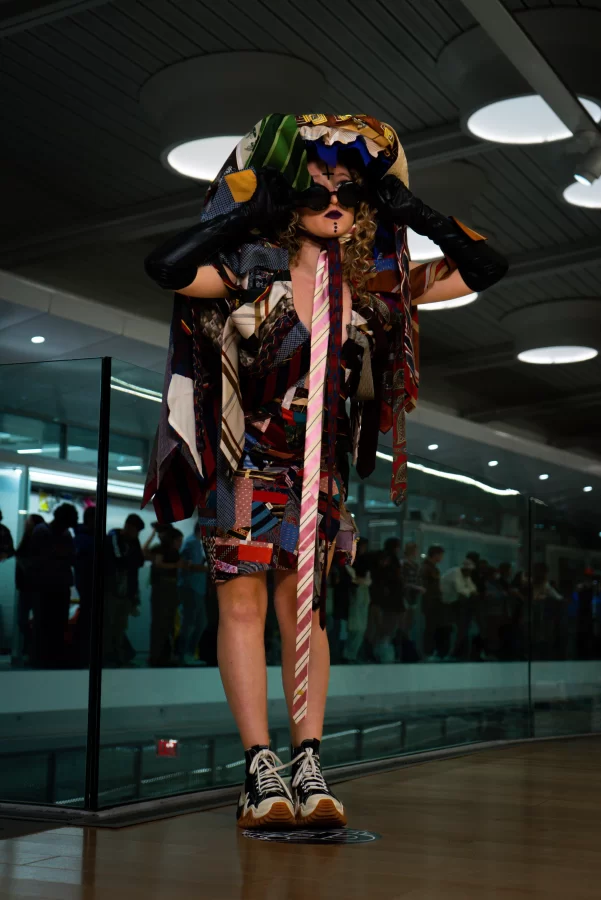The second Circular Fashion Expo kicked off this Saturday at the Siebel Center of Design. Throughout the day, visitors could be seen browsing a variety of homemade, handcrafted or thrifted items from vendors.

Charlotte Watson models “Groom” designed by William Hohe at the Circular Fashion Expo on Saturday.
Visitors could also bring in their own clothing and exchange it for tokens, which they could then use on other clothing items within the exchange. At the very end, the expo’s main highlight was a student-led and created fashion show.
CFE was founded by Josh Jay James, senior in Business, and is based on a circular economic model as a response to the waste that the fashion industry creates. According to Earth.org, 92 million tons of clothes are discarded every year and even though clothing production has doubled, the lifetime of a garment’s use has decreased.
A circular economy addresses the environmental impacts of fashion by creating a system in which clothing items are repurposed, extending the lifetime of each garment.
“Circularity is the highest form of sustainability,” James said. “This includes resale, upcycling, rental — anything that takes to ensure that garments receive their highest value in the system.”
James said that he started the expo because he wanted to bring together members of the fashion community to tackle the issue.
“The demand for sustainable practice and circularity is very high for students who really want to participate in this circular economy but don’t have the means to do so,” James said.
One vendor at the event was Fern Greydinger, sophomore in ACES, who sold jewelry made out of thrifted materials. She said that she thinks the CFE is a good way to get students to engage in more sustainable behaviors.
“It’s hard to make anything sustainable, you’re reaping the earth for resources,” Greydinger said. “But I think that this is a good idea because college students often have stuff they want to get rid of and (the event) is a really great way to keep those things out of landfills.”
Both James and William Hohe, sophomore in FAA and the current head of creative direction at CFE, realize that changing our economic and social relationship with fashion is a huge undertaking.
“The user experience of buying fast fashion is immaculate — (companies) make it ridiculously easy to find exactly what you want,” James said. “The biggest challenge of beating fast fashion is making second hand equally as accessible.”
James is currently working on an app with the Director of Gies Consulting Jacob Kinsey and College of Media’s Department Head Mike Yao. Using tokens, the app aims to create a sharing ecosystem to increase the accessibility and convenience of garment exchange.
“(At the event), people can take their unwanted things and donate them to the clothing swap and … we will award them tokens for their donation,” James said. “People can spend these tokens within the clothing swap to buy new things and then repeat. “
Hohe notes that opening up art resources traditionally only available to Art + Design students and making creative spaces can aid the transition to sustainable fashion.
“We (need to) democratize systems to not only benefit students’ individual skill sets but collective (ones),” Hohe said.
Hohe said that he feels connected to fashion and the values that CFE promotes.
“My own personal fashion has always been second hand … so I feel very connected to the cause,” Hohe said. “Not only through fashion but also through my art and (photography).”
Hohe is also director of photography for The Fashion Network, an RSO that collaborates with CFE to host the event. A few of Hohe’s designs were featured in the last portion of the event — the catwalk.
The fashion show reflected artistic concepts from a variety of different backgrounds. The looks in the fashion show were created from recycled, handmade and thrifted items.
One look included a dress and headpiece made out of ties and scrap fabric while another look repurposed a vintage wedding dress. The audience response to the models and the artists was overwhelmingly positive, and the crowd remained engaged throughout the show.
The brand Bad For Your Health, co-founded by Nolan Nemeroff and Jack Struthers, both seniors in Media, won multiple awards. Their look “Who Burns, Who Mends?” was a patched outfit resembling the American flag and the design “Nature’s Resurrection” featured a jacket covered in plants.
“I really like fashion so I was interested to see the different booths and the different designs people came up with,” said Zyara Morton, a sophomore in LAS, who attended the event.
James hopes that the CFE helps students to not only explore fashion, but also inspires them to create new solutions to current problems.
“I want people to walk away with a new outfit or some new art,” James said. “I (also) want people to feel like they can explore these new business models or explore new upcycling techniques.”
Hohe added on to James’ sentiments, noting that he hopes the CFE will not only inspire, but also motivate individuals to take action.
“Inspiration is still a state of personal inertia,” Hohe said. “I want people to come away with a compelling, tangible drive to start changing what they’re doing.”


